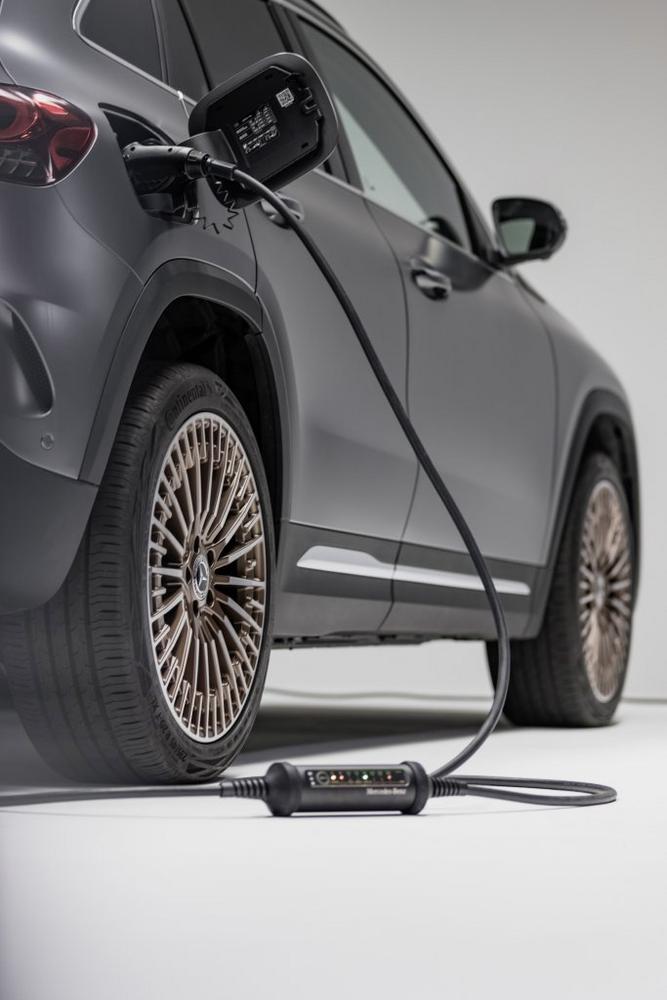Electric mobility continues to gain ground, with more and more customers opting for an innovative and sustainable drive system – either as a plug-in hybrid or as a fully electric vehicle. With the EQC, EQA and EQV, as well as the EQS due to be launched in the summer, Mercedes-Benz is currently offering four high-performance models with zero emissions (0 g CO2/km) that point the way to the future. In addition, more than 20 variants of Mercedes-Benz vehicles will be available as plug-in hybrids by the end of the year – from the A-Class to the GLE, from saloon to estate, with petrol or diesel engines. However, all vehicles with electric drive systems have one thing in common: they need to be charged. Wallbox, public charging station or household socket: the possibilities are many – and each connection requires its own charging cable. This is where the new Flexible Charging System comes into play. It is compatible with all current and future models of electric vehicles and plug-in hybrid vehicles from Mercedes-Benz AG. With this compact, portable charging solution, you always have exactly the system you need in your car boot – whether at home, in the underground car park at work, or when travelling.
At the vehicle end of the charging system is an integrated Type 2 connector, which can be used for easy charging of all European vehicles. The various adapters can be conveniently plugged in at the adapter separation point. The system automatically detects the different adapters and adjusts the charging power accordingly. The maximum charging power of the Flexible Charging System is 22 kW, although this can also be adjusted manually if so required. As with all Mercedes-Benz accessory solutions, safety is the top priority. Integrated temperature sensors in the household adapters protect against overheating. The system can be driven over with a weight of up to 1.1 tonnes and is protected according to IP67 even in the event of temporary submersion. It has integrated residual current circuit breakers, is designed for a temperature range of -30 to +50 °C, and almost all components are AECQ-certified. Thanks to the handy overall length of the charging system of approx. five metres, power sources that cannot be directly accessed by a vehicle can also be used efficiently. In addition, thought has also been given to the various types of sockets found in other countries and, in addition to the Schuko plug that is the most widely used in Europe, the necessary plugs for Switzerland and the UK are also available separately. The system is suitable for both indoor and outdoor use.
The Flexible Charging System is packed in a high-quality case in which all accessories neatly find their place, so putting an end to the tangle of all the different charging cables in the boot. Accessories include a five-metre extension cable, a security lock and a wall-mounted holder; all adapters are also available separately. The retail price in Germany is 1225 euros.
Mercedes-Benz AG is responsible for the global business of Mercedes-Benz Cars and Mercedes-Benz Vans, with over 170,000 employees worldwide. Ola Källenius is Chairman of the Board of Management of Mercedes-Benz AG. The company focuses on the development, production and sales of passenger cars, vans and vehicle-related services. Furthermore, the company aspires to be the leader in the fields of electric mobility and vehicle software. The product portfolio comprises the Mercedes-Benz brand with the sub-brands of Mercedes-AMG, Mercedes-Maybach, Mercedes-EQ, G-Class and the smart brand. The Mercedes me brand offers access to the digital services from Mercedes-Benz. Mercedes-Benz AG is one of the world’s largest manufacturers of luxury passenger cars. In 2020 it sold around 2.1 million passenger cars and nearly 375,000 vans. In its two business segments, Mercedes-Benz AG is continually expanding its worldwide production network with around 35 production sites on four continents, while gearing itself to meet the requirements of electric mobility. At the same time, the company is constructing and extending its global battery production network on three continents. As sustainability is the guiding principle of the Mercedes-Benz strategy and for the company itself, this means creating lasting value for all stakeholders: for customers, employees, investors, business partners and society as a whole. The basis for this is Daimler’s sustainable business strategy. The company thus takes responsibility for the economic, ecological and social effects of its business activities and looks at the entire value chain.
Mercedes-Benz Niederlassung Stuttgart
Mercedesstr. 102
70372 Stuttgart
Telefon: +49 (711) 25900
http://www.mercedes-benz-stuttgart.de/
Telefon: +49 (176) 30964654
E-Mail: jochen.kraeft@daimler.com
![]()
